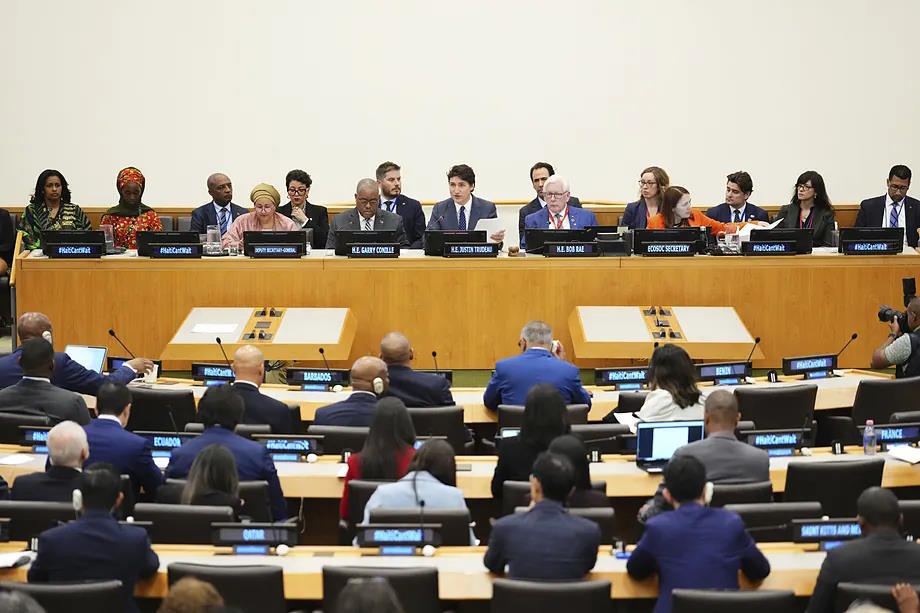The UN General Assembly has given the green light to the so-called Pact for the Future, a 66-page document conceived as a philosophical roadmap for a "brighter future for all of humanity, including those living in poverty and vulnerable situations."
The document, in the classic language of multilateralism, promises a fight "for a safe, peaceful, just, equal, inclusive, sustainable, and prosperous world, where well-being, security, dignity, and a healthy planet are ensured." However, it does so, as usual, with objections from countries like Russia, Nicaragua, or Belarus, who wanted to add a paragraph on "non-interference" and tried to reopen it at the last minute. And with the opposition of Iran, North Korea, Syria, and Sudan.
Beyond the anecdote, everything surrounding the Future Summit and the 79th session of the General Assembly, held this week, shows the problems, limits, and weaknesses of the international system, with the UN at its core. On one side are those who believe that it is "necessary to renew the commitment to international cooperation based on respect for international law," as the world faces "deeply interconnected challenges that far exceed the capacity of any State alone and can only be addressed collectively." On the other side are those who do everything in their power to sabotage that cooperation, those who do not believe in a rules-based system, and those who also do not believe in or apply democracy or the rule of law.
This Pact symbolizes everything that is right and wrong with the UN and international cooperation. It has been 18 long and exhausting months to put on the table a text acceptable to almost 200 governments and that addresses many of the major global problems in a time marked by pandemics, wars, and hatred.
The Pact aims to "pull multilateralism back from the brink", in the words of Secretary-General Antonio Guterres, and to deeply reform an organization that has become obsolete, with instruments designed for the world of 1945, not 2024. But it is not binding, the support is far from unanimous, and concrete progress is unlikely to materialize soon, due to the usual votes, vetoes, and quarrels.
Although Russia and its puppets have once again been the major obstacle, with a final scene trying to disrupt the arrival of leaders, the most important dividing line in these negotiations does not run from east to west, but from north to south. It pits the wealthy nations that created and manage the world order against the developing and post-colonial nations that no longer settle for being passive recipients.
"The former prefer a fragmented approach to global reform and preserving the privileges they enjoy in international institutions, particularly in global economic governance. The latter want a more equal multilateral system that enhances their voice, power, and interests and can offer debt relief, development assistance, trade opportunities, climate financing, and access to cutting-edge technologies like artificial intelligence. Governments and citizens of the Global South have been outraged by the perceived indifference of the wealthy world to their difficult situation," summarizes Stewart Patrick of the Carnegie Endowment for International Peace.
The document therefore aspires to promote reform of the Security Council, a redesign of the institution's financial architecture, and new regulations for technological advances, especially Artificial Intelligence. But above all, it indirectly seeks to close the evident, growing, and dangerous gap between the West, which leads the way, and the so-called Global South, which sympathizes or clashes with the theories, narratives, and actions of Moscow or Beijing.
Despite the effort and rhetoric, the debates of these days, in addition to the clashes of the past year, show that this is far from being achieved. A significant part of this Global South is far from satisfied and has no intention of remaining silent or signing without protest, as in the past.
"The Future Pact should serve as a compass towards a future that needs more cooperation than confrontation (...) Division will not be the end of the United Nations because we remain committed to treating each other with respect and fairly," said German Chancellor Olaf Scholz, who has been one of the co-facilitators of this pact alongside Namibia. Scholz organized an additional lunch on Monday, inviting Spanish President Pedro Sánchez, Canadian Prime Minister Justin Trudeau, and Brazilian Luiz Inácio Lula Da Silva, among others, to address global governance or international financial architecture, the topic chosen by Sánchez in his speech to the Future Summit plenary.
Developing countries have been particularly militant in demanding concrete commitments regarding the reform of financial institutions, with the aim of ensuring easier access to financing, especially considering the effects of climate change. "The current governance approach reinforces the idea that it is acceptable to have first and second-class citizens," criticized Barbados Prime Minister Mia Mottley, also invited by Germany and praised from Moncloa in recent days. Spain and Brazil are jointly organizing a forum on "extremism in politics" this Tuesday, with French President Emmanuel Macron, Chilean President Gabriel Boric, or British Prime Minister Keir Starmer, as well as several African leaders, totaling about twenty participating countries.
The Pact does not explicitly address the rise of authoritarianismnor the delicate situation of democracy and the rule of law globally, critical factors for understanding global instability. It repeatedly talks about democratizing global governance systems, including the Security Council, but it stops there, at the international level, not domestic. It talks about press freedom, but in wars, not where journalists are most persecuted. The same goes for the judiciary and other key issues.
